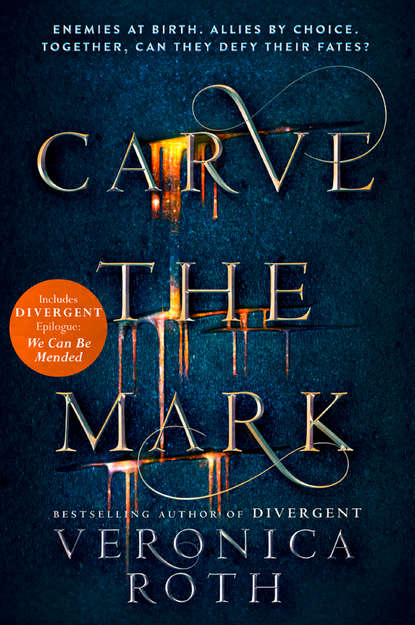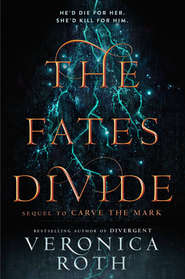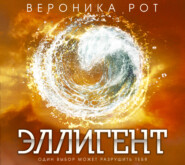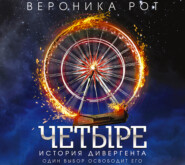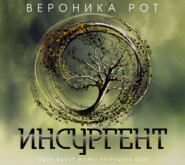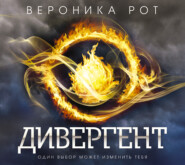По всем вопросам обращайтесь на: info@litportal.ru
(©) 2003-2025.
✖
Carve the Mark
Настройки чтения
Размер шрифта
Высота строк
Поля
“Go ahead and tell Ryzek that. I’m sure he’ll listen to you.”
Across from me, Lety’s eyes were focused on the webs of dark color that stained my skin, surging into new places every few seconds—the crook of my elbow, the rise of my collarbone, the corner of my jaw.
“What do they feel like to you?” she asked me when she caught my eye.
“I don’t know, what does any gift feel like?” I said irritably.
“Well, I just remember things. Everything. Vividly,” she said. “So my gift feels like anyone else’s … Like ringing in my ears, like energy.”
“Energy.” Or agony. “That sounds right.”
I swallowed some of the fermented feathergrass in my glass. Her face was a steady pinhole with everything spinning around it; I fought to focus on her, spilling some of the drink on my chin.
“I find your fasci—” I paused. Fascination was a difficult word to say with so much painkiller coursing through my veins. “Your curiosity about my gift a little strange.”
“People are so afraid of you,” Lety said. “I simply want to know if I should be, too.”
I was about to answer, when Ryzek stood at the end of the table, his long fingers framing his empty plate. His rise was a signal for everyone to leave, and they trickled out, Suzao first, then Zeg, then Vakrez and Malan.
But when Uzul began to move toward the door, Ryzek stopped him with a hand.
“I’d like to speak with you and your family, Uzul,” Ryzek said.
I struggled to my feet, using the table to balance. Behind me, Vas pushed a bar across the door handles, locking us in. Locking me in.
“Oh, Uzul,” Ryzek said with a faint smile. “I’m afraid tonight is going to be very difficult for you. You see, your wife told me something interesting.”
Uzul looked to Yma. Her ever-present smile was finally gone, and now she looked equal parts accusatory and afraid. I was sure she wasn’t afraid of Uzul. Even his appearance was harmless—he had a round stomach, a sign of his wealth, and feet that turned out a little when he walked, giving his gait a slight hobble.
“Yma?” Uzul said to his wife weakly.
“I didn’t have a choice,” Yma said. “I was looking for a network address, and I saw your contact history. I saw coordinates there, and I remembered you talking about the exile colony—”
The exile colony. When I was young, it was just a joke that people told, that a lot of Shotet who had met with my father’s displeasure had set up a home on another planet where they couldn’t be discovered. As I grew older, the joke became a rumor, and a serious one. Even now, the mention of it made Ryzek work his jaw like he was trying to tear off a bite of old meat. He considered the exiles, as enemies of my father and even my grandmother, to be one of the highest threats to his sovereignty that existed. Every Shotet had to be under his control, or he would never feel secure. If Uzul had contacted them, it was treason.
Ryzek pulled a chair from the table, and gestured to it. “Sit.”
Uzul did as he was told.
“Cyra,” Ryzek said to me. “Come here.”
At first I just stood by my place at the table, clutching the glass of fermented feathergrass. I clenched my jaw as my body filled with shadows, like black blood from broken vessels.
“Cyra,” Ryzek said quietly.
He didn’t need to threaten me. I would set my glass down and walk over to him and do whatever he told me. I would always do that, for as long as we both lived, or Ryzek would tell everyone what I had done to our mother. That knowledge was a stone in my stomach.
I put my glass down. I walked over to him. And when Ryzek told me to put my hands on Uzul Zetsyvis until he gave whatever information Ryzek needed to know, I did.
I felt the connection form between Uzul and me, and the temptation to force all the shadow into him, to stain him black as space and end my own agony. I could kill him if I wanted to, with just my touch. I had done it before. I wanted to do it again, to escape this, the horrible force that chewed through my nerves like acid.
Yma and Lety were clutched together, weeping, Yma holding Lety back when she tried to lunge at me. Our eyes met as I pushed the pain and the inky darkness into her father’s body, and all I saw in her was hate.
Uzul screamed. He screamed for so long I grew numb to the sound.
“Stop!” he wailed eventually, and at Ryzek’s nod, I took my hands from his head. I stumbled back, seeing spots, and Vas’s hands pressed to my shoulders, steadying me.
“I tried to find the exiles,” Uzul said. His face was slick with sweat. “I wanted to flee Shotet, have a life free from this … tyranny. I heard they were on Zold, but the contact I found there fell through. They had nothing. So I gave up, I gave up.”
Lety was sobbing, but Yma Zetsyvis was still, her arm wrapped across her daughter’s chest.
“I believe you,” Ryzek said softly. “Your honesty is noted. Cyra will now administer your punishment.”
I willed the shadows in my body to drain out like water from a wrung rag. I willed the current to leave me and never return—blasphemy. But there was a limit to my will. At Ryzek’s stare the currentshadows spread, like he controlled them more than I did. And maybe he did.
I didn’t wait for his threats. I touched my skin to Uzul Zetsyvis’s until his screams filled all the empty spaces in my body, until Ryzek said to stop.
(#ulink_66cdb659-e2a5-5b08-b22c-d0f4a291f1e8)
I SAW WHERE I was only dimly, the smooth step beneath my foot—bare now, I must have lost a shoe in the dining room—and the shifting fenzu light reflected in the floorboards and the webs of black coursing up and down my arms. My fingers looked crooked, like I had broken them, but it was just the angle at which they were all bent, digging into the air as they sometimes dug into my own palms.
I heard a muffled scream coming from somewhere in the belly of Noavek manor, and my first thought was of Eijeh Kereseth, though I had not heard his voice in months.
I had seen Eijeh only once since his arrival. It had been in passing, in a corridor near Ryzek’s office. He had been thin, and dead in the eyes. As a soldier muscled him past me, I had stared at the hollows above his collarbone, deep trenches now empty of flesh. Either Eijeh Kereseth had an iron will, or he really didn’t know how to wield his currentgift, just as he claimed. If I had to bet on one or the other, it would be the latter.
“Send for him,” Ryzek snapped at Vas. “This is what he’s for, after all.”
The top of my foot skimmed the dark wood. Vas, the only one who could touch me, was half carrying me back to my room.
“Send for who?” I mumbled, but I didn’t listen to the answer. A wave of agony enveloped me, and I thrashed in Vas’s grip as if that would help me escape it.
It didn’t work. Obviously.
He peeled his fingers away from my arms, letting me slide to the floor. I braced myself on hands and knees in my bedroom. A drop of sweat—or tears, it was hard to say—fell from my nose.
“Who—” I rasped. “Who was screaming?”
“Uzul Zetsyvis. Your gift has a lingering effect, evidently,” Vas replied.
I touched my forehead to the cool floor.
Uzul Zetsyvis had collected fenzu shells. He had showed me, once, the more colorful ones, pinned to a board in his office, labeled by harvest year. They were iridescent, multicolored, as if they held strands of the currentstream itself. He had touched them like they were the finest things in his house, which was bursting at the seams with wealth. A gentle man, and I … I had made him scream.
A while later—I didn’t know how long—the door opened again, and I saw Ryzek’s shoes, black and clean. I tried to sit up, but my arms and legs shook, so I had to settle for just turning my head to look at him. Hesitating in the hallway behind him was someone I recognized distantly, as if from a dream.
He was tall—almost as tall as my brother. And he stood like a soldier, straight-backed, like he knew himself. Despite that soldier’s posture, however, he was thin—gaunt, really, little shadows pooling under his cheekbones—and his face was again dappled with old bruises and cuts. There was a thin scar running along his jaw, ear to chin, and a white bandage wrapped around his right arm. A fresh mark, if I had to guess, still healing.
He lifted his gray eyes to mine. It was their wariness—his wariness—that made me remember who he was. Akos Kereseth, third child of the family Kereseth, now almost a grown man.





